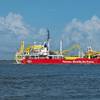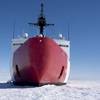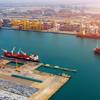Increased Drug Trafficking in Indian Ocean Needs Action
Heroin from Afghanistan is increasingly trafficked through the Indian Ocean and more international action is needed to prosecute smugglers on the high seas, the United Nations anti-crime and drug body said on Tuesday.
In the last 18 months, more than 4,200 kg of heroin have been seized in the Indian Ocean on the way to East Africa, Europe and North America, and quantities are rising, according to the Combined Maritime Forces (CMF), a multinational maritime force that is seizing narcotics in the area.
Most traffickers are let go after the drugs are thrown overboard, said Deputy Commander Keith Blount of CMF at a U.N. meeting in Vienna. National authorities often lack the right or capacity to make arrests outside their territorial waters.
"We cannot allow a culture of impunity on the high seas to flourish," said Yury Fedotov, executive director of the United Nations Office on Drugs and Crime (UNODC), adding production of opium had reached record highs in Afghanistan.
"Inability to prosecute traffickers (on the) high sea remains a major issue. As we can see, drug seizures alone have not deterred criminals, who remain at large due to the lack of enforcement capacity," Fedotov said.
The UNODC estimates that around 80 per cent of the world's opium and heroin are produced in Afghanistan, with drugs trade accounting for up to 15 per cent of its gross domestic product. The UNODC advocates using the same approach that it says helped crush a surge in piracy in the Indian Ocean in recent years.
That would include sharing intelligence across borders, helping countries in the region to build prisons and courts and revising national laws to cope with the problem and prosecute traffickers.
The Seychelles has been successful in limiting piracy in their waters through such regional efforts, including coordination to issue international arrest warrants, senior officials from the island state told the meeting.
Tougher action against drug trafficking over land in the Balkan regions and the war in Syria have diverted some flows of narcotics from Afghanistan further south, through Pakistan or Iran, into the Indian Ocean, the U.N. body said.
"In the last four years there has been a significant shift in heroin-trafficking patterns," the UNODC said in a statement.
(Reporting By Shadia Nasralla; Editing by Larry King)












